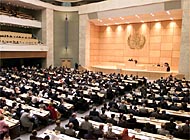Geneva Social Summit: a step forward, or a setback?

The UN Social Summit in Geneva has ended with delegations pledging their commitment to fight poverty. But the negotiations that led to the final declaration exposed deep differences between rich and poor countries.
The United Nations said the special session of the General Assembly had made “significant advances” that would enable countries and international organisations to better implement the commitments made at the UN Social Summit in Copenhagen five years ago.
The General Assembly session in Geneva was called to assess the progress made since 1995, and remove the hurdles that have prevented the goals of Copenhagen from being reached. The summit in the Danish capital was seen as a watershed, the first time poverty eradication had been placed at the heart of the international political agenda. Geneva was seen an opportunity to reaffirm the world’s commitment to social development.
But non-governmental groups have given the gathering the thumbs down. Several Swiss groups said the summit had achieved only modest results. They regretted that there had been no concrete decision to free up more resources for tackling poverty.
“There is no commitment to implement what the governments have decided,” Peter Niggli, of the Swiss coalition of Development Groups said.
“They just want texts that are not legally binding. Here in Geneva, the relationship between the economic forces and the people who need change remained the same,” Niggli, a member of the Swiss delegation to the summit, told swissinfo.
Some cynics have renamed the summit “Copenhagen minus five”, rather than “Copenhagen plus five” as it has been dubbed by some organisers. It is a view rejected by United Nations officials. They say that given the wildly differing positions of developing countries and the industrialised world, the outcome is very positive.
“It’s totally unfair to say there hasn’t been progress,” says John Langmore, head of the UN’s social policy division and a key figure in the negotiations.
“There isn’t a single decision that moves backwards from Copenhagen, and there are scores that have strengthened provisions in many areas,” he told swissinfo.
Langmore points out that the assembly committed itself to halving absolute poverty by 2015, the first-ever global poverty-reduction target.
Negotiators also hammered out agreements on studying a tax on short-term capital movements, which had been vigorously opposed by the United States, as well as on the importance of better representation for developing countries at the International Monetary Fund and the World Bank. Consensus was also reached on protecting social services in countries affected by financial crises.
But critics say the haggling over the wording has watered down the final text and made it meaningless. It also exposed the wildly varying stances adopted by the most industrialised nations and the poorest.
“These discussions are totally blocked,” says Peter Niggli. “As long as the West doesn’t make real concessions, especially at the WTO, the developing countries will continue to block all the other conferences, be it Geneva or elsewhere.”
But John Langmore says that despite the West’s refusal to budge on some issues, the Social Summit has revealed a greater readiness to accept change.
“I think there has been a strengthening of political will,” Langmore says. “Of course not enough has been agreed, but it’s clear that progress has been made.”
“There is now a universal recognition that if globalisation is to benefit everyone, and not just the few, there have to be major changes in strategy and policy, and they are reflected in a host of different ways in the Geneva Declaration,” he said.
The UN session was also criticised for failing to set a date for another follow-up summit. While five years is regarded as not long enough to implement policies and evaluate them, NGOs say it sends out the wrong signal.
Running in parallel to the General Assembly session was Geneva 2000, a forum for civil society, organised by the Swiss government. Its aim was to involve NGOs, business leaders, academics and trade unions in the debate with a view to devising new strategies and avoiding the polarisation that has too often accompanied discussions surrounding globalisation.
“We were very pleased with the attendance at Geneva 2000. Most participants felt the discussions helped to sharpen their ideas and push the agenda for social development forward,” says Daniel Stauffacher, the Swiss Economics Ministry official responsible for organising the forum.
“New initiatives were put on the table in Geneva, and they will have an effect in the medium term. The influence of civil society definitely has an influence on delegations, and it will have an impact, perhaps not in Geneva, but certainly in the next round,” Stauffacher told swissinfo.
by Roy Probert

In compliance with the JTI standards
More: SWI swissinfo.ch certified by the Journalism Trust Initiative
You can find an overview of ongoing debates with our journalists here. Please join us!
If you want to start a conversation about a topic raised in this article or want to report factual errors, email us at english@swissinfo.ch.